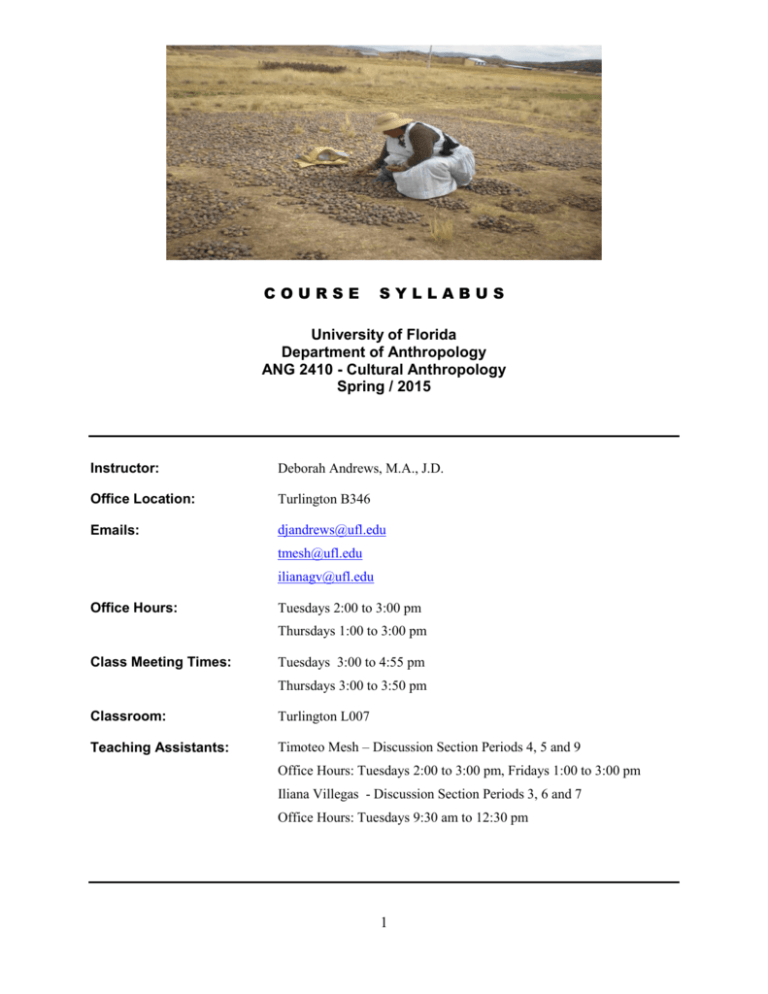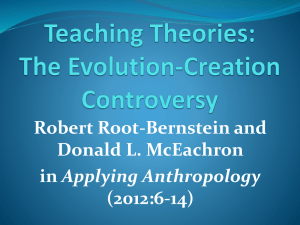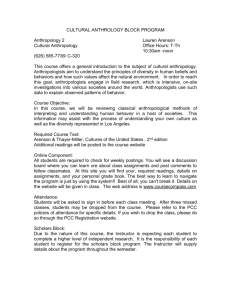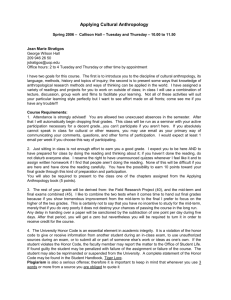Cultural Anthropology - Anthropology at the University of Florida
advertisement

COURSE SYLLABUS University of Florida Department of Anthropology ANG 2410 - Cultural Anthropology Spring / 2015 Instructor: Deborah Andrews, M.A., J.D. Office Location: Turlington B346 Emails: djandrews@ufl.edu tmesh@ufl.edu ilianagv@ufl.edu Office Hours: Tuesdays 2:00 to 3:00 pm Thursdays 1:00 to 3:00 pm Class Meeting Times: Tuesdays 3:00 to 4:55 pm Thursdays 3:00 to 3:50 pm Classroom: Turlington L007 Teaching Assistants: Timoteo Mesh – Discussion Section Periods 4, 5 and 9 Office Hours: Tuesdays 2:00 to 3:00 pm, Fridays 1:00 to 3:00 pm Iliana Villegas - Discussion Section Periods 3, 6 and 7 Office Hours: Tuesdays 9:30 am to 12:30 pm 1 Course Description Cultural anthropology is the study of humanity around the world, including diversity, universals and change. This course addresses the nature and integration of culture. It includes the content of cultures; languages, subsistence, economic structures, art and religion in human societies. As a diversity course, this course provides instruction in the values, attitudes and norms that create cultural differences within the United States. This course encourages students to recognize how social roles and status affect different groups in the United States. Students are expected to analyze and evaluate their own cultural norms and values in relation to those of other cultures and to distinguish opportunities and constraints faced by other persons and groups. Course Learning Objectives The concepts in this course will include theory, historical and traditional perspectives, and contemporary and divergent perspectives related to issues relevant today. A goal is to learn to analyze and evaluate different cultural perspectives in order to understand human diversity. Upon successful completion of this course, each student will: - Understand the holistic nature of the study of humans through anthropology. - Understand the broad concepts of cultural anthropology. - Understand how the anthropological perspective is useful in a wide range of other disciplines. - Develop an understanding and appreciation of the diversity of human culture. - Understand the interconnectedness of our world and how it is being transformed through globalization, development, and migration. Required Texts / Readings Schultz, Emily and Robert H. Lavenda. 2013. Cultural Anthropology. 9th Edition. ISBN: 9780199350841 Other Readings American Anthropological Association, “Race: Are We So Different?” (http://www.understandingrace.org/home.html ) Bernard, H. Russell 2011 Research Methods in Anthropology: Qualitative and Quantitative Approaches. Lanhan, MD: Altamira Press. Collier, Stephen J, and Aihwa Ong 2007 Global Assemblages, Anthropological Problems. In Global Assemblages. Aihwa Ong and Stephen J Collier, eds. Pp. 1-21. Oxford, UK: Blackwell Publishing Ltd. Cronk, Lee 2012 Reciprocity and the Power of Giving. In Conformity and Conflict: Readings in Cultural Anthropology. Boston: Pearson. Farmer, Paul 1999 Infections and Inequalities: The Modern Plagues. Berkeley: University of California Press. Farmer, Paul, Jim Yong Kim, Arthur Kleinman and Matthew Basilico 2013 Reimagining Global Health: An Introduction. Berkeley: University of California Press. 2 Fish, Jefferson M. 2012 Mixed Blood. In Conformity and Conflict: Readings in Cultural Anthropology. Boston: Pearson. Hanna, Bridget and Arthur Kleinman 2013 Unpacking Global Health: Theory and Critique. In Reimagining Global Health: An Introduction. Berkeley: University of California Press. Lee, Richard Borshay 2012a Eating Christmas in the Kalahari. In Conformity and Conflict: Readings in Cultural Anthropology. Boston: Pearson. 2012b The Hunters: Scarce Resources in the Kalahari. In Conformity and Conflict: Readings in Cultural Anthropology. Boston: Pearson. Lock, Margaret and Vinh-Kim Nguyen 2010 The Normal Body. In The Anthropology of Biomedicine. New York: Wiley-Blackwell. Miner, Horace 1956 Body Ritual Among the Nacirema. American Anthropologist 58(3):503-507. Oliver-Smith, Anthony 2013 Disaster Risk Reduction and Climate Change Adaptation: the View From Applied Anthropology. Human Organization 72(4):275-282. Tsing, Anna 2000 The Global Situation. Cultural Anthropology 15(3):327-360. United Nations The Universal Declaration of Human Rights. http://www.un.org/en/documents/udhr/ Weatherford, Jack 2012 The Founding Indian Fathers. In Conformity and Conflict: Readings in Cultural Anthropology. Boston: Pearson. Readings will be posted on e-learning. Course Requirements: Three Exams Discussion section Pop Quizzes Academic Research Paper Draft final paper Peer Review Final paper TOTAL 225 points (75 points each) (45% total) 50 points (10%) 25 points (5%) 50 points (10%) 40 points (8%) 25 points (5%) 85 points (17%) 500 points (100%) Exams (225 points total): There will be three exams in this course. Each exam is 75 points. These exams will be based on the class lectures, textbook and additional readings. The exams will be non-cumulative. Discussion Section (50 points) You are required to attend your assigned discussion section. Attendance will be taken. You are required to participate during discussion section. Your grade for this component of the course will be derived from your attendance and the quality of your participation. Points will be deducted for unauthorized use of laptops and cell phones in the class, unexcused absences and lateness. You must attend discussion sections even if an exam is scheduled for the same day. Only university-approved absences with appropriate documentation will be excused. You will be counted absent from discussion section if you arrive more than 10 minutes late. 3 Pop Quizzes (25 points): We will have unannounced pop-quizzes throughout the semester to assess students’ comprehension of class materials and discussions. These quizzes will also serve as proof of attendance. Students will not be allowed to make-up missed quizzes or exams without a doctor’s note and must notify the instructor before the missed class. Research Project (200 points Total): You will work on a research project that applies the concepts covered in the class. The first part of this project consists of an academic research paper about a topic related to cultural anthropology. You will choose from one of the options below and you will develop a research question as the focus of your project. The second part of this project consists of you interviewing three different people about your research topic. Option 1: Interview three people who learned English as a second language. You will also research the first language of the people you interview. The people you interview must speak different languages. You will interview you research participants at least once, asking about information related to the learning of English as a second language. You will select a specific topic related to language. Option 2: Interview three people from different religions on their opinions on religion in today’s culture. You will also research the history or concepts of the three different religions. You will select a specific topic related to religion. Option 3: Interview three different people of different racial compositions or ethnicities about their opinions on the topic of race or ethnicity in today’s culture. You will also research the history or concepts applicable to the different races or ethnicities. You will select a specific topic related to race or ethnicity. Option 4: Interview three people of different genders and ages on their opinions on gender in today’s culture. You will also research the history and concepts related to gender. You will select a specific topic related to gender. Your interview questions will focus on the topic you choose from this course. Academic Research Paper (50 points) Based on the selection from the topics listed above, you will conduct academic research focusing on one or more topics covered in this class. You must use a minimum of three peer-reviewed journal articles. You may also use additional sources. You will write a preliminary paper that introduces your subject and discusses the academic literature on your topic. There must be at least one paragraph describing each academic article: failure to use at least three academic journal articles will result in a mandatory point deduction. There must be an introduction and conclusion paragraph, as well as a bibliography. Draft Paper (25 points) You will write a draft paper that includes a description of all of your interviews and research. This paper must include your academic research, a description of how you selected your participants, a discussion of the interviews, comparison of the interviews, a conclusion, and a bibliography. This must be a coherent submission with good grammar. It will not be the final paper, but will contain enough information so that you can obtain feedback for final revisions. You will also attach the interview worksheets as an appendix to the draft as part of the assignment. Peer Review (25 points) Your draft paper will be exchanged with other students. Each student will evaluate the draft paper and provide written feedback to the student to help them improve their final paper. 4 Final Paper (85 points): You will write a final paper that is 6 to 8 pages long, double spaced, with one inch margins. This final paper will describe your research question, describe your academic research on the topic, describe your interviews, and contain a discussion section and conclusion. Your discussion section will synthesize the three articles with your research topic. Your conclusion must include thoughts on future research. NOTE: ALL PAPERS MUST BE UPLOADED TO E-LEARNING. HARD COPIES MUST BE TURNED IN BY THE TIME OF THE CLASS LECTURE. PAPERS MAY BE TURNED IN DURING DISCUSSION SECTION IN ADVANCE OF THE DEADLINE. Class participation: Students are expected to come to class having read carefully the reading assignments for that session. They should be prepared to contribute to class discussions by raising questions and comments related to the topic for that class. There will be pop quizzes, so class attendance is necessary. Discussion section attendance and participation is also necessary to achieve all points. Attendance and Make-up Policies: Attendance is not taken in lecture, but is highly encouraged. Students not in attendance cannot make-up pop quizzes, view videos, or take exams. The only exception to this rule is if you discuss alternate plans with the instructor prior to the absence or produce proper documentation afterwards (i.e., doctor’s note). Other than this stated exception, this policy is non-negotiable. Extra Credit: Extra credit opportunities will be announced during the semester. In addition to the class requirements and extra credit assignments, a total of 2 extra credit points are available for creativity for any project and class participation. Continuity of Instruction: In the event of disruption of normal classroom activities due to an emergency such as hurricane, pandemic or other unforeseen event or combination of events, the format of this course may be modified in order to enable completion of the course requirements. In that event, you will be provided an addendum to this syllabus that will supersede this version. It is your responsibility as a student participant to be proactive during any emergency to find instructions that I will post on e-learning. Grading Standards GRADING SCALE Letter grades are assigned based on the total percent of points according to the following scale: A = 91 or above A- = 90 – 90.9 B+ = 87-89.9 B = 81-86.9 B- = 80-80.9 C+ = 77-79.9 C = 71-76.9 C- = 70-70.9 D+ = 67-69.9 D = 60-66.9 D- = 59-59.9 E = 58.9 or below 5 A grade of C− is not a qualifying grade for major, minor, Gen Ed, or College Basic distribution credit. Additional information on UF grading policy can be found at: https://catalog.ufl.edu/ugrad/current/regulations/info/grades.aspx Policy on late work and/or missed exams Missed exams and quizzes may be taken late only in the event of documented, approved excuses. Documented illness or injury, with a written medical note, are approved excuses. The documented death of a close family member (parent, grandparent, sibling, child, aunt, uncle or cousin) is excused so long as the dates coincide. Mandatory University of Florida events are also excused with advance notice and approval. Late assignments are strongly discouraged. Work turned in within the first 24 hours after the deadline receive an automatic 10% deduction. Each day thereafter is an additional 10% deduction. This late policy applies with the exception of the draft paper and peer review worksheets, which will not be accepted if they are late, and will result in full point loss. Requirements for class attendance and make-up exams, assignments, and other work are consistent with university policies that can be found at: https://catalog.ufl.edu/ugrad/current/regulations/info/attendance.aspx University of Florida Policies Honesty: As a result of completing the registration form at the University of Florida, every student has signed the following statement: "I understand that the University of Florida expects its students to be honest in all their academic work. I agree to adhere to this commitment to academic honesty and understand that my failure to comply with this commitment may result in disciplinary action up to and including expulsion from the University." Claiming One’s Own Work Each student is honor-bound to submit under his or her name or signature only his or her own work; to fully acknowledge his or her use of any information, ideas, or other matter belonging to someone else, and to properly document the source in question; and to offer for credit only that work which he or she has completed in relation to the current course. Violations of Academic Integrity There are several types of violations; these include but are not limited to: cheating; fabricating and falsifying information or citations; submitting the same work for credit in more than one course; plagiarizing; providing another student with access to one’s own work to submit under this person’s name or signature; destroying, stealing, or making inaccessible library or other academic resource material; and helping or attempting to help another person commit an act of academic dishonesty. Please review the University policy on academic integrity. 6 Classroom Behavior Rules Harassment and Discrimination “Harassment” is defined as conduct that (1) is of any type (written, oral, graphic, or physical) (2) is directed towards or against a person because of their personal status (i.e. race, religion, sex, sexual orientation, political affiliation, national origin, age, disability, marital status, pregnancy or others) and that (3) unreasonably interferes with the individual’s work, education, or participation in activities or programs at UF or creates a working or learning environment that a reasonable person would find threatening. “Discrimination” is defined as a conduct that (1) adversely affects any aspect of an individual’s employment, education, or participation in activities or programs at UF, and (2) is based on one or more personal characteristics listed above. Any student who feels their rights have been violated are asked to confront the offending party, should that not resolve the issue, or the student is uncomfortable with confronting the offending party they may file a complaint with UF Department of Human Resources. ACCOMMODATIONS FOR DISABILITIES Students requesting classroom accommodation must first register with the Dean of Students Office. The Disability Resource Center will then provide documentation to the student that you must give to Dr. Young. Students who wish to find out if they are eligible for services can contact the Disability Resource Center at www.dso.ufl.edu/drc, call 352-392-8565, or stop by their office at room 0001, Building 0020 (REID HALL). UF Counseling Services Resources are available on-campus for students having personal problems or lacking a clear career and academic goals which interfere with their academic performance. These resources include: 1. University Counseling Center, 301 Peabody Hall, 392-1575, personal and career counseling; 2. Student Mental Health, Student Health Care Center, 392-1171, personal counseling; 3. Sexual Assault Recovery Services (SARS), Student Health Care Center, 392-1161, sexual counseling; 4. Career Resource Center, Reitz Union, 392-1601, career development assistance and counseling; 5. Reading & Writing Center, Broward Hall, 392-0791, writing assistance, study skills, test preparation. For further information: http://www.counseling.ufl.edu/cwc/Default.aspx Course evaluations Students are expected to provide feedback on the quality of instruction in this course by completing online evaluations at https://evaluations.ufl.edu. Evaluations are typically open during the last two or three weeks of the semester, but students will be given specific times when they are open. Summary results of these assessments are available to students at https://evaluations.ufl.edu/results/. 7 Software Use All faculty, staff, and students of the University are required and expected to obey the laws and legal agreements governing software use. Failure to do so can lead to monetary damages and/or criminal penalties for the individual violator. Because such violations are also against University policies and rules, disciplinary action will be taken as appropriate. Texting or talking on cell phones during class is not allowed. Critical Dates Research Paper Due Jan. 29 Exam 1 Feb. 5 Draft Paper Due Feb. 26 Peer Review Due March 12 Exam 2 March 24 Final Paper Due April 9 Exam 3 April 21 8 T E N T A T I V E S C H E D U L E SPRING 2 0 1 5 Reading/Assignments Week Week 1 Week 2 Week 3 Week 4 Week 5 Week 6 Week 7 Week 8 Dates 01/06/15 – 01/09/15 Topic/Activities Course orientation Introduction to Anthropology 01/12/15 – 01/16/15 The Culture Concept and Anthropological Theory 01/19/15 – 01/23/15 Methods and Ethnography 01/26/15 – 01/30/15 Politics,of Law and Characteristics Culture Social Order Kinship and social organization Medical Anthropology Reading Assignment: Syllabus Schultz and Lavenda Ch. 1 and 4 Reading Assignment: Schultz and Lavenda Ch. 2 Miner, “Body Ritual of the Nacirema” Reading Assignment: Schultz and Lavenda Ch. 3 Lee, “Eating Christmas in the Kalahari” Religion and Spirituality Research Paper Due Globalization and Thursday, Jan. 29 Development 02/02/15 – Social Identity and Gender 02/06/15 Applied Anthropology EXAM 1 Thursday Feb. 5 Reading Assignment: Schultz and Lavenda Ch. 11 and 12 Reading Assignment: Schultz and Lavenda Ch. 13 Bernard 2011 Ch. 8 02/09/15 – 02/13/15 Race and Ethnicity 02/16/15 – 02/20/15 Culture and the Environment; Economic Anthropology 02/23/15 – 02/27/15 Religion, Spirituality and Worldview Reading Assignment: American Anthropological Association, “Race: Are We So Different?” Fish, “Mixed Blood” Reading Assignment: Schultz and Lavenda Ch. 10 Lee, "The Hunters: Scarce Resources in the Kalahari" Cronk, "Reciprocity and the Power of Giving" Reading Assignment: Schultz and Lavenda Ch. 8 Draft Paper Due Thursday February 26 Week 9 03/02/15 – 03/06/15 No Class SPRING BREAK 9 Week 10 03/09/15 – 03/13/15 Language and culture Social networks and communication Meaning, Expression, and Creativity Peer Review Due March 12 Week 11 03/16/16 – 03/20/15 Politics, Law and Social Peer Review Due Order Thursday March 12 Week 12 03/23/15 – 03/27/15 Exam 2 Tuesday, March 24 Week 13 03/30/15 – 04/03/15 Globalization, Development and Migration Week 14 04/06/15 – 04/10/15 Applied Anthropology Medical Anthropology Reading Assignment: Schultz and Lavenda Ch. 5, 6 and 7 Reading Assignment: Schultz and Lavenda Ch. 9 UN Universal Declaration of Human Rights Weatherford, “The Founding Indian Fathers” To be announced Reading Assignment: Schultz and Lavenda Ch. 14 Collier and Ong 2007, Global Assemblages Reading Assignment: Oliver-Smith 2013 Tsing 2000 Final Paper Due Thursday, April 9 Week 15 04/13/15 – 04/17/15 Week 16 04/20/15 – 04/22/15 Medical Anthropology Reading Assignment: Farmer 1999 Farmer 2010 Hanna and Kleinman 2013 Lock and Nguyen 2010 No Lecture Exam 3 Tuesday, April 21 Classes End This schedule is subject to change at the discretion of the Professor. 10








